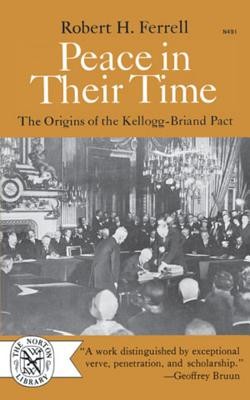
- We will send in 10–14 business days.
- Author: Anderson Ferrell
- Publisher: W. W. Norton & Company
- ISBN-10: 0393004910
- ISBN-13: 9780393004915
- Format: 12.7 x 20.3 x 1.8 cm, softcover
- Language: English
- SAVE -10% with code: EXTRA
Reviews
Description
After World War I, private peace groups proliferated and rapidly became a significant force in American politics. These groups' activities were regarded by the Harding and Coolidge administrations as a bungling interference with the regular conduct of diplomacy. Ultimately, however, President Coolidge yielded to domestic pressure and the efforts of French foreign minister Aristide Briand to conclude a peace treaty. A protracted series of negotiations between the United States and France resulted in the multilateral Kellogg-Briand Pact, the treaty to outlaw war.
The Kellogg-Briand Pact, Mr. Ferrell writes, was the peculiar result of some very shrewd diplomacy and some very unsophisticated popular enthusiasm for peace. In analyzing the forces that produced the treaty, Peace in Their Time reveals significant aspects of American foreign policy in the interwar period.
EXTRA 10 % discount with code: EXTRA
The promotion ends in 20d.10:15:09
The discount code is valid when purchasing from 10 €. Discounts do not stack.
- Author: Anderson Ferrell
- Publisher: W. W. Norton & Company
- ISBN-10: 0393004910
- ISBN-13: 9780393004915
- Format: 12.7 x 20.3 x 1.8 cm, softcover
- Language: English English
After World War I, private peace groups proliferated and rapidly became a significant force in American politics. These groups' activities were regarded by the Harding and Coolidge administrations as a bungling interference with the regular conduct of diplomacy. Ultimately, however, President Coolidge yielded to domestic pressure and the efforts of French foreign minister Aristide Briand to conclude a peace treaty. A protracted series of negotiations between the United States and France resulted in the multilateral Kellogg-Briand Pact, the treaty to outlaw war.
The Kellogg-Briand Pact, Mr. Ferrell writes, was the peculiar result of some very shrewd diplomacy and some very unsophisticated popular enthusiasm for peace. In analyzing the forces that produced the treaty, Peace in Their Time reveals significant aspects of American foreign policy in the interwar period.


Reviews